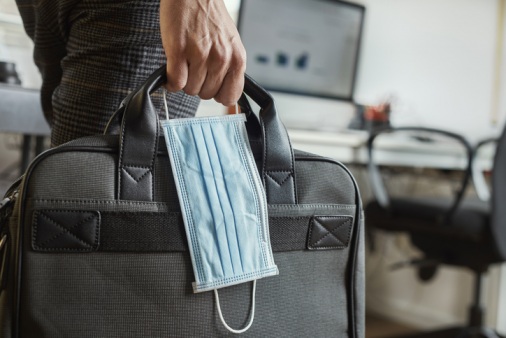Covid-19 - Act now to protect your employees and protect your business

Authored by QBE Interim Executive Director, UK Insurance, Matt Lacy
Businesses have showed incredible resilience in adapting to the coronavirus pandemic, with many coming up with inventive ways to say afloat. Employee health and wellbeing has been front and foremost for many too, which is not only morally correct but also makes great business sense.
The debate is growing about the extent to which Covid-related liability claims might materialise and while this is difficult to predict, there is still much businesses can do to protect employees’ health and wellbeing, which could prevent claims down the line. Ensuring good controls and documentation are in place will also help ward-off spurious or opportunistic claims.
Covid-19 infection risk
Covid-19 has the potential to touch many forms of liability, from claims against directors and officers to cyber attacks and data breaches. However, the largest source of Covid-related liability could stem from employees, namely Covid-19 infections in the workplace and the physical and mental effects of home working.
At the end of January 2021, over 3.5 million people in the UK had tested positive for Covid-19, a staggering number that will grow significantly before the pandemic runs its course. Establishing where and how people caught Covid-19 is often not possible, but data from the UK’s Health and Safety Executive (HSE), however, gives some indication of workplace exposure to Covid-19. Between April 2020 and January 2021, the HSE was notified of 21,622 work related Covid infections, including 254 death notifications.
While transmission can occur in almost any setting, some workers are more exposed than others. According to the Office for National Statistics, workers in healthcare and public-facing roles, such as taxi drivers and cleaners, face the highest risk of contracting coronavirus, as do security guards, construction workers, and retail assistants. Working in confined spaces with close proximity to others, such as in food processing plants, or when sharing vehicles or accommodation, are also likely to increase the risks of being infected.
Stress and home working claims
Employers also face the prospect of personal injury claims from indirect consequences of the pandemic, in particular mental health issues and occupational injuries related to remote working.
During the first lockdown in April 2020, almost 47% of people in employment worked at home at least some of the time, of which 86% did so as a result of the coronavirus pandemic. This is a huge increase on the 5% working at home pre-pandemic. However, home workers are susceptible to musculoskeletal injuries, such as neck and back pain or repetitive strain injury, especially where they lack an appropriate workspace and equipment. According to a recent survey, four in five people say they have developed musculoskeletal pain since working at home during lockdowns.
Covid-19 is also believed to be having a negative impact on mental health and wellbeing. Almost one in five adults (19.2%) were likely to be experiencing some form of depression during the pandemic last year, according to ONS data, more than double the pre-pandemic number. According to QBE research carried out in 2020, employees are at risk of burnout during lockdowns, with 1 in 5 workers putting in more work hours due to career concerns. Almost half reported feeling anxious (49%) while 44% said that they were finding it difficult to separate work and home life (58% of those with children said they were finding it difficult to balance childcare and work).
Novel claims
For businesses, the key drivers for liability will be around establishing causation and whether a firm breached its statutory duties. Another important factor will be the ability of a business to evidence that appropriate steps were taken to meet these legal obligations, such as following government guidelines.
Establishing causation is likely to be a particular challenge for claimants, given the difficulty in proving where and how a person caught coronavirus. For example, two employees may test positive, but were they infected at work, when commuting or socialising outside of work. However, Covid-19 infections do often occur in clusters with outbreaks centred on a single location, such as a factory or food processing plant.
According to the European Centre for Disease Prevention and Control, there were 1,376 Covid-19 outbreaks in occupational settings across Europe between March and early July 2020.
In addition to causation, claimants would also need to demonstrate an employer breached their duty of care, or failed to adhere to government Covid-related guidance. However, guidance is not always easy to implement in the workplace, and employers and workers may disagree on interpretation, such as their ability to work from home, or the safety of the workplace. The HSE, for example, has received 134,000 complaints from concerned employees since the crisis started.
Act now to protect employees
Actions taken now by businesses could potentially avoid Covid-19 liability claims further down the line. Investing in wellbeing can help avoid claims related to stress and burnout, and there are some relatively simple measures that companies can take to look after employees during this stressful period. For example, offering staff additional paid leave to allow for home schooling, or ensuring that employees take regular breaks when working at home.
Proactive risk management and wellbeing programmes are essential to reduce the risk of injury and maintain employees’ mental health and morale.
To help businesses navigate their way through the Covid-19 crisis, QBE has developed a Covid-19 toolkit, with associated check listing resources. The tool kit helps companies assess their risks and provides essential guidance in key areas, such as workplace safety, compliance and wellness.
Businesses that are well prepared will be in a better position to deal with the potential liabilities arising from the pandemic, should they materialise. Businesses are under a moral obligation to protect employees during the pandemic, but there is also a financial imperative to avoid unnecessary claims, as well as defend against spurious or fraudulent claims.
About QBE
QBE European Operations is part of QBE Insurance Group, one of the world’s leading international insurers and reinsurers and Standard & Poor’s A+ rated. Listed on the Australian Securities Exchange, QBE’s gross written premium for the year ended 31 December 2018 was US$13.7 billion.
As a business insurance specialist, QBE European Operations offers a range of insurance products from the standard suite of property, casualty and motor to the specialist financial lines, marine and energy. All are tailored to the individual needs of our small, medium and large client base.
We understand the crucial role that effective risk management plays in all organisations and work hard to understand our clients’ businesses so that we offer insurance solutions that meet their needs – from complex programmes to simpler e-trading solutions – and support them in minimising their risk exposures. Our expert risk management and rehabilitation practitioners focus on helping clients improve their risk management so that they may benefit from a reduction in claims frequency and costs.

